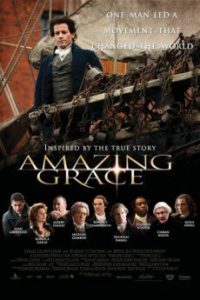I’m a sucker for an unsung hero. I’m betting that most of you have never heard of William Wilberforce. I hadn’t until I saw Amazing Grace. There is something inordinately moving about a man who stands up for what is right and makes a difference in this life.
Wilber, as he was often called was a man of stirring principle and tireless will. Elected to the House of Commons at the age of 21, and on his way to a successful political career, Wilberforce, over the course of two decades, took on the English establishment and persuaded those in power to end the inhumane trade of slavery. 
I have to admit, as an American, when I think of slavery my thoughts go immediately to my own American history books, but this story is not just about slavery, it’s about slave trading.
As played by Ioan Gruffudd, William Wilberforce is the sort of grave, God-fearing young man who annoys everyone else by being both moral and right. We see his concern for whipped carriage horses first, but its whipped humans who become his life’s work, by the late 17th century, there were 11 million Africans in the West Indies, and Great Britain was the superpower of slave traders. The details of the Middle Passages are hideous but business is so good that no one wants to hear about them.
With perseverance and yes, sometimes cunning, Wilber is able to turn the tide. Watching the film, you get a sense of Europe reeling under the weight of history. At the start, England is about to lose the Revolutionary War; by the end, beheadings in Paris have those across the channel fearfully fingering their collars. It was a time of birthing new ideas; a birthing that was painful.
By now you may be asking how the song many of us first heard as children ties into the movie; John Newton (Albert Finney), an ex-slave trader turned minister wrote these lyrics and became Wilberforce’s spiritual counselor. Torn between ministry and politics, Newton convinced Wilberforce that he was born “for such a time as this.” That he had been placed in a position as a powerful Member of Parliament to secure the abolition of the slave trade. It was in the House of Commons, Newton stated, that Wilberforce could best serve God.
There is a love interest, Barbara Spooner (Romola Garai) met Wilberforce in 1797 when she was 20 and he was 38. After two weeks of courtship they married. The pair shared their lives for 36 years until his death in 1833.
As a sidebar, in my research I found a Wilberforce University in Wilberforce, Ohio. Founded in 1856, Wilberforce University can trace it’s origin to a period of history before the Civil War, when the Ohio Underground Railroad was established as a means of escape for all those blacks who sought freedom in the North. England actually abolished slavery a half century before the United States.
In Amazing Grace we have an incredibly robust and talented cast, a superb director and a truly Amazing story. A little taste of history that you may not have been aware of portrayed in an epic adventure. An evening well spent. I invite comments, Carolyn@carolynhastings.com
Leave a Reply